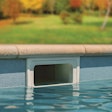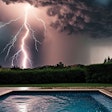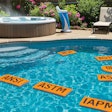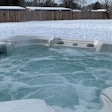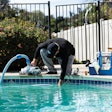
When the curtain came down on the U.S. economy in 2007, the vast majority of builders and retailers took quite a beating, as financing became difficult and homeowners hunkered down in survival mode.
However, many of these homeowners already owned pools and tubs, and it made sense to continue to maintain them. So service departments at pool retail stores were generally able to avoid personnel cuts, and sole proprietors cautiously reported stable earnings. Some were even able to raise prices a little, despite the mass layoffs and dreadful economic news of the early recession.
As the recession wore on, money and relative success being an attractive force, other pool and spa professionals (and even newly unemployed people from outside the industry, some unable to tell a pool from a pole) began jumping into the service business, leading to a dramatic increase in competition that continues to this day.
As we open the swimming season in 2012, the overall health of the service industry is good, and there is reason to hope it will get even better.
The economy remains a mixed bag. Many areas of the country are still suffering recession-like effects, but that has been a constant refrain for at least four years. Mingling with it now are strong statements by servicers seeing signs of real growth for the first time.
“The economy has picked up,” said one service pro. Another attributed his better profitability to an “improving local economy and aging of equipment in service area.”
Perhaps the most enthusiastic assessment came from Stewart Vernon, founder and president of ASP, Macon, Ga., a swimming pool service franchise company with 93 locations ranging from Dallas to D.C.
“I think we have a pretty good gauge on the consumer,” he said, “and we feel that the consumer is opening up more, feeling much more confident about the economy, and really more willing to spend money in their backyard today than they were two and three years ago for sure.
“The numbers don’t lie and the phone doesn’t lie and what the homeowner spends doesn’t lie. We’re seeing customers pay their bills a little bit faster, respond to advertising a little bit better and our sales are up. So we feel that the economy is right on the verge of really starting to improve.”
That’s the sunny side. In places like Las Vegas and Sacramento, where housing prices dropped by 50 percent or more in the downturn and unemployment remains stubbornly high, the gloom of the recession remains.
One serviceman’s revenues continue to be depressed, he said, due to “foreclosures, lackluster economy, and no growth in building industry.” That is a sentiment echoed throughout the survey by many.
With that said, taken as a whole, more people said hiring, service rates and revenue were up than down.
Firms in hiring mode rose from 22 percent in 2010 to 28 percent in 2011, and more than a quarter of firms in 2011 felt confident enough to raise rates, as opposed to only 5 percent that felt pressure to lower rates, although other factors besides the economy – such as rising fuel prices and intense competition – played an important role in these decisions.
Revenues were up, too. Overall, 47 percent reported an increase in revenue as opposed to 37 percent reporting a decrease.
Everyone had good reasons for their performance, whether it was stellar or it stank. One serviceman said his pool upgrade dollars had grown because people couldn’t sell their homes – they were forced to stay put, so they decided to renovate.
Another was on the upswing simply due to the hiring of a “new repair tech that knows how to sell.” Others pointed to a new marketing strategy or the inevitable release in pent-up demand for upkeep and maintenance after a long recession.
Ordinary events played a role. One company was suffering because the “city built new bridge blocking our sign to the highway,” while others simply had bad pool weather in 2011.
Don’t Tread On Me
Many of the major issues that have dominated industry thinking remain the same. Government intrusion into industry affairs has intensified in the past few years, and overwhelmingly, service people resent it.
They especially resent being compelled to follow a host of mandates from state governments — everything from workers’ compensation to licensing to energy efficient pump laws — while competitors flout these laws to their advantage.
Stories of unlicensed competition selling cheap, 1.5-hp single-speed circulation pumps in California (where such pumps are supposedly banned) are as common as sunny days in Escondido.
And the halting, dithering and even vacillating implementation of VGB and ADA has also left many service people feeling jerked around by legislators and bureaucrats who have no real understanding of the pool industry.
On these points respondents were clear and direct. The following comments typified the general sentiment:
“Government tries to implement laws and regulations with no REAL way of enforcement. Leaving it up to service companies to educate customers is not a solution. Our concern is what the competition is telling them.”
“We need enforcement of contractors without proper license, workers’ comp, general liability. They underbid us all the time since they do not have those added charges.”
“I’m tired of constant government intervention.”
Given the prospects for further action on ADA and VGB, as well as pending state measures across the country, this topic is likely to remain a source of irritation for the foreseeable future.
Profits And Products
But let’s talk about the money makers. There was one product that stood out clearly and overwhelmingly as a major profit center among service people last year (and the year before, and the year before that), and that was the salt chlorine generator.
Despite all the sales shenanigans and doubts among industry personnel about its real value to the overall pool system, the SCG remains a favorite upgrade among the people that count – consumers.
Truly, salt is king. Service people sold that piece of equipment for profit all across the U.S. last year. Consumers think it’s cheaper and easier to operate a pool with a salt system, and they like the feel of the water.
In the product rankings, variable-speed pumps came in a distant second and then a host of products all tied for third place — everything from UV systems to heat pumps to cover lifters.
A Troubled Feast
With steady sales of products, and pool routes retaining their shape, there was a general sense of well-being throughout the survey, or at least stability. However, people who own or work in a small business have to keep an eye out for trouble, and when asked to name their greatest source of anxiety for the future, gas prices, the economy, and the government topped the list of industry concerns.
Some felt their local economy has seen little improvement and that rising gas prices may yet kill any incipient growth. And many listed state and federal governments as an oppressive force in the industry, working against their interests as small business owners and workers.
Competition with other service providers and with the Internet for equipment sales also was a major concern.
We all have problems, but on the whole, the people in the pool and spa service industry are an optimistic group. Two respondents summed that sunny attitude up pretty well. One said, “I don’t really have any concerns. I feel like we have weathered the worst and it should be a busy year, as usual.”
Another positive thinker echoed that contentment: “This is running pretty much just as I want it to...”
What change would you like to see in the service industry?
“I have tried to get all the local dealers involved in helping each other; most think I am trying to gain their customers; I’m not. We need each other to grow the industry as a whole . . . Plumbers here do this and it works great!”
“Have advertisements that talk about the difference between CPO-trained pool professionals or similarly trained and why it’s so important to homeowners. Car makers talk about how their factory-trained technicians are better. Why don’t we do the same?”
“Federal regulations need to lighten in the commercial portion. Mom-and-pop places are not going to be able to afford all these regulations, therefore the pools become obsolete, which decreases business for all of us.”
“SPA BRANDING! We are losing the consumer to other activities. Spas are hard to use, don’t work reliably and cost way too much in upkeep — that’s the general consumer feeling. We need to win back sales from boats, travel, motorcycles, all of the things people spend their money on except us.”
“We would like to see the salt system dealers be truthful to their customers about the maintenance and performance of their products. They are told they do not have to check the pH and alkalinity levels of their pool chemistry or have to add chlorine again. We all know they do not produce chlorine when the water temperature is below 60 degrees or above 90 degrees.”
“Less legislation. Consumer is losing confidence.”
Business Is Robust
Help Wanted

There was a clear and growing trend toward hiring, reflecting the general health of the service sector. The percentage of polled firms in hiring mode went up from 22 percent to 28 percent, year on year, whereas the number of businesses laying off employees remained at 16 percent for both 2010 and 2011.
Over half kept staffing levels unchanged.
Rates On The Rise

The same forces that drove hiring also powered rate increases in more than a quarter of the firms. Only 5 percent were pressured into lowering rates in order to stay competitive and retain business. And again, these numbers were even better in 2011 than 2010.
A number of respondents noted that a rise in gas prices (and the expectation of even higher gas prices to come) prompted an increase in rates.
“Will be raising rates in 2012 based on gas pricing.”
“Raised rates on new customers only.”
“We actually raised some rates, but the majority stayed the same because of new service industry competition.”
Elbows Out

With evidence of hiring and rising rates, it comes as no surprise that increased competition was a dominant response in the sample. This new competition came from existing companies looking to expand and from entirely new service providers entering the market.
A full 38 percent of respondents reported increased local competition in 2011, as opposed to 10 percent who saw competition diminish.
Revenue
Profit Centers

Maintenance and repair continued as the profit center leader for our respondents, as it was in 2010, with water balance/cleaning in second place. Renovation grew in importance, however. In 2010 it was ranked fourth in importance to the bottom line. In 2011, it was tied for second. Overall, salt system installation averaged 5th in importance, but for 12 percent of providers, it was their No. 1 profit center, indicating a focus on salt conversions as a business emphasis.
Products That Surprised
A lot of people remained impressed with the popularity of salt systems, automatic chlorinators and variable-speed pumps, but here are a few items you might not have thought of that made money for our respondents:
Hot tub cover lifters | Solar heaters | Aquaclean automatic pool cleaners | Ozone | UV Systems | Reverse osmosis | Phosphate-removal products | Zeolite for sand filters | Challenger pump and motor | The Big Green Egg | LED lights | Pool Rx | Liquid Solar Blanket | Natural Chemistry | Refurbished hot tubs | VIP maintenance on demand | Surface polishing — one job after another, by word of mouth | Mineral-removal products | ProTeam Supreme Plus | HASA liquidators | Motor bearing replacements instead of pump upgrades | Pool Blasters | Adding block ice to reduce the pool temperature | Automated pH-controlled salt systems
Reasons revenue went up:
“More aggressive in lead followup.”
“More focus on the complete service package.”
“We see thousands of aging tubs in the field, and continue to increase our off-brand service business due to competitors closing their doors.”
“New repair tech knows how to sell.”
“Tighter route, less travel to accounts.”
“We now service all brands of spas rather than just the brand we sell, and we partnered with realtors to do pool inspections on homes about to be sold.”
Reasons revenue went down:
“Increased competition from outside sources like landscapers, electricians, etc.”
“Unlicensed techs working for low rates.”
“Drop-off in revenues after VGB work died down.”
“New healthcare changes.”
“Additional competition and do-it-yourselfers. Many customers have read how-to articles on the Internet.”
“City built new bridge blocking our sign to the highway.”
Service Vehicles
Most of the companies in the survey run fewer than 4 service vehicles, mostly vans and trucks. Some like the big one-ton trucks, but there are service people that pack their essentials in little Toyota Ravs and Ford Focuses.

The most popular model of vehicle in the survey was the Ford F-150, due to it’s rugged performance and durability. Other popular models included the Chevy Silverado and S-10, the Toyota Tacoma and Tundra, and the Ford Ranger.
What’s On Your Mind?
Gas prices, the economy, and the government topped the list of industry concerns. Some felt their local economy has seen little improvement and that rising gas prices will kill any incipient growth. And many see the state and federal government as an oppressive force in the industry, working against their interests. Competition with other service providers and with the Internet for equipment sales also was a major concern.
Some of the issues of concern for service providers:
“Who will be our new president, and how small businesses will get treated tax-wise.”
“Competition, rising costs, and government interference and regulation.”
“Insurance costs because of Obama. We have had health insurance for over 20 years and have never seen the increases we have seen in the last two years. Obama is hurting small business.”
“Fly by night service companies that have no insurance or location that undercut everyone.”
“The ability of ‘Joe Weekend Warrior’ to purchase hot tub parts on the Internet for near cost. This trend has got to stop.”
What, besides the economy, is the BIGGEST and most pressing concern affecting the entire pool and spa business?

“Insurance, mainly healthcare costs are skyrocketing and unaffordable.”
“The constant inflow of poorly thought out, poorly worded, vague regulations that cost a lot but do little to actually increase safety.”
“Online companies that can sell product for less than I pay through distribution.”
“The way that government tries to implement laws and regulations with no REAL way of enforcement. Leaving it up to service companies to educate customers is not a solution. Our concern is what the competition is telling them.”






























